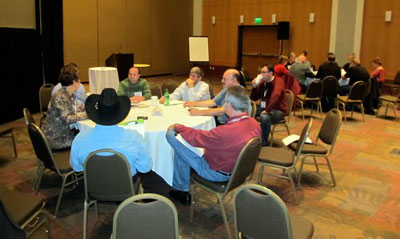
Click on the logo to go to the NPE website.
2012 "Best Practices" for Power Sweeping Contractors
by Ranger Kidwell-Ross, editor of WorldSweeper.com.
At the 2012 National Pavement Exposition a NAPSA-sponsored best practices seminar for power sweeping contractors was held. Except where noted, the following article was compiled entirely from notes taken at the seminar by the author. In some instances, the author supplemented information from his own experience and knowledge.
The overall seminar was moderated by Gabriel Vitale, president of New Jersey-based C&L Sweeper Service.
In the three-hour seminar, each of the approximately 50 seminar participants had an opportunity to split out and contribute to three different topic areas. Each of the topic areas was facilitated by the owner of a substantial-sized sweeping company.
At the end of the roundtable discussions in each area, the facilitators on each topic provided a brief report to the group as a whole on the highlights of what had emerged within their topic areas. Below are the notes taken at the end of the seminar by Ranger Kidwell-Ross, the editor of WorldSweeper.
Note that the information in many of the sections has been expanded to include information by the author as well as, in some cases, links to relevant articles at the WorldSweeper.com website.

Facilitators and Discussion Topics:
Grayson Carter, Bill's Sweeping Service
Leveraging the power of the web: Taking the mystery out of social media
Mark Carter, Bill's Sweeping Service
A single page report about the status of your company: What would it look like?
Ron Lichtenstein, Algonquin Sweeping and Striping
Measuring driver productivity
Jim Larko, Katsam Enterprises
"Cleaning up" on sweeper sales
Ken Lindsey, Commercial Power Sweep, Inc.
Are you prepared for an "in-house" emergency?
Debbie Jacketta, Jacketta Sweeping Service
Tips, tricks and traps to find time to work "on" your business
 " "
Although the term 'social media' actually encompasses many different websites, the most commonly known are Facebook, Twitter and Linked-In. For the purposes of this overview, those are the social media sites that will be discussed. In addition, some tips for company advertising on search engines, like Google Adwords, are included.
Search Engine Advertising
Set up search terms that cover each business area that you want to advertise, for example power sweeping, line striping, sealcoating, etc. Keep in mind that you should be using both single words and phrases that someone might type in to describe what they are looking for.
Both of the most well-known advertising mediums, Google and Yahoo, allow you to define the geographical distance from your office that you want your ads to appear. Be sure to set this up correctly so you will not be paying for ads to appear outside your service area.
The good news is you will pay a prescribed dollar amount only when someone clicks on your ad and is taken to your website. However, this can still get expensive if you don't put a daily or monthly limit or 'cap' on the amount you are willing to pay. A daily limit is widely considered to be better, since this would spread out your ad clicks and, some say, reduce the risk of a competitor clicking on your ads in order to use up your budget.
For more information on this topic see the world sweeper article entitled "15 Tips for Small Business PPC Advertising." On the WorldSweeper.com site is also an article for contractors called "Ways You Can Generate LOCAL Web Traffic For Free."
Facebook, Twitter, LinkedIn
If you do not know how to set up an account, simply search on the Internet. You will find a host of links that provide a step-by-step process for setting up your accounts and monitoring them.
Many contractors wonder what they can post on these sites that will be interesting to their subscribers. Example ideas given included business tips, topics that are business sales related, and community information. You may want to also include inclement weather advisories and your availability during holidays.
Google Resources
Google has become the dominant force in several areas of the web. There was general agreement that Google Analytics is the best way to track visitors to your website. Google Places is also a relatively new free service that helps you connect your business with local customers. A comprehensive article on Google Places is available on the WorldSweeper.com website. Note that the search engine Bing now has a similar business listing service.
Miscellaneous
- Look into adding QR Codes onto your website. These make it easy for smartphone users to scan the code and embed your website onto their phone for easy reference. WorldSweeper also has an article that explains this topic in detail.
- For Twitter users. There is a website called 'Social Oomph' provides many free and premium features to help automate usage.
- Advice on your future website: Even if you're not ready to build a website, buy your domain name now to reserve it for future use.

The concept of this topic was to investigate what a snapshot of your company would look like. What types of information would you be able to know; what portions of your operation would remain a mystery?
The presenter told a story about being at a hockey game with a friend who was the owner of more than 20 McDonald's franchises. While at the game, the owner learned on his smartphone that his cost for something like the average Happy Meal had drifted above his set baseline. By learning that information, the franchisee knew what actions to take the next day to reverse the course.
The following were cited as 'areas of interest,' or types of data, that a sweeping contractor might want to know:
- Operations report
- Customer field contacts
- Change reports
- GPS reports and routing: Many agreed that GPS systems more than pay for themselves. Also general agreement that it was, at the very least, important to review any significant deviations in the data on a daily basis.
- Sales pipeline (what's in it; who fell out): An online $15/mo. per user Customer Retention Management (CRM) system called 'PipelineDeals' was cited as being helpful and user-friendly. It apparently offers both a tickler system and the ability to generate a daily report via phone.
- Customer retention: Twice a year the presenter said he determines who are currently his top 10 customers. Then, either he or his operations' manager are detailed to contact them.
- Financial data: It was suggested there are many 'dashboards' available that allow better, easier analysis of Quickbooks data. Type "dashboard Quickbooks" (keep quotes) into a search engine to see many available options.
- State of your fleet: Keep daily track of what vehicles are down, what are facing scheduled maintenance. Set up a good communications' system between management and your repair team.
Weekly Reports
- Use web analytics from Google or elsewhere to determine where your website traffic is coming from.
- Get a report that shows you what % of prospective jobs you bid on that you close.
- Track the costs per lead type: Website vs. Pay Per Click vs. Tradeshows vs. Sales calls, etc.
Personal and Staff Development
- Provide long term training for key employees. This adds morale and in the case of an accident or emergency occurring to the head of the company there will be others who can run the company.
- Institute a rotation system whereby rank-and-file employees get to have 'face time' with the boss. This should key in on topics besides just work-related: go to lunch, a hockey game, etc.
- Personally improve yourself with books and other resources. Presenter mentioned that he alternates business and pleasure books in order to keep a better balanced life and keep learning. "Who you are five years from now is a function of who you associate with and the books you read."

The concept of this topic was to discuss and find the correct balance between efficiency and productivity.
There was general agreement that the focus should be on quality. Ideally, have a GPS system in each sweeper. Also make sure your operators have a list of what needs to be done at each customer location.
Ongoing communication was seen as a key, along with driver/operator training so they know what they should be doing. Make sure they are aware of all aspects of the job at each location, so a corner, loading dock, etc. isn't being left dirty every night. If you don't have a 'duty sheet' for each stop then you will also have trouble when you have to put a new or alternate operator into the sweeper.
Part of the discussion centered on how to continue to communicate with operators given the recent ban on cell phone usage. One contractor indicated he thought the drivers could still use a Garmin system legally. Also mentioned was that if you get into a buying group of some kind you could save 20% on cell phones.
There was general agreement that a 'no cell phone usage' policy should be added to Employee Manuals, with a place for operators to sign that they have read and understood that they are not to use cell phones while operating any vehicle on company time.
Contractors were asked what GPS systems they used. Those mentioned included SageQuest and Fleetmatics.
Input on GPS included that you should track items like auxiliary on/off, brooms up/down and dust suppression on/off, in addition to other more standard items like driving speed and time on the lot.
Instead of relying on occasional 'snapshots' that indicate time on the lot, use the average time on lot so you can account for differences in different seasons. Use the average to compare to amount of $$ the account is being charged.
Include in your analysis the travel time between accounts and any changes in it. Some drivers may change their route between stops for some reason and this will be reflected in longer or shorter travel times.
The presenter, Ronald Lichtenstein of Algonquin Sweeping, provided his pdf handout for our readers. Here is the link.

Intent of the seminar was to determine some actions that could help increase sales.
- Subscribe to your local Business Journal(s): These will provide you with all types of business news (which you may be able to re-report on your Facebook, Twitter, etc. accounts); local promotions (which provide you with a reason to call people); new companies that you can call on.
- Know your competition. That's the only way you will know how to sell against them – but never badmouth your competition. Instead, talk about what you have to offer that you know they do not. Know their weaknesses and sell against them with your strengths.
- Network. Networking is a great way to get more business. This should be both with allied types of businesses where you can get referral work and other sweeping contractors where you can refer work out of your area (and get similar referrals from them).
- Use both sides of your business card. Put all of your services onto the back of your business cards. That way, anyone with one of your cards knows all that you do.
- Business cards for all. Make sure your operators and other employees all have generic company business cards (they write their name on the back so you know where the prospect got the card) and know what they'll receive if someone signs up for services as a result of their contact.
- Be sure to have at least a free listing in the Bluebook. You will then get notices for any RFPs that go out in your area that include a need for sweepers.
- Try to turn one-time sweeps into scheduled sweeps. When someone calls for a one-time sweep, try to sell them on scheduling at least a quarterly sweep. Find out what other properties they may handle; other areas where you might be able to assist them.
- Keep up your equipment. Keep your equipment looking good and working up to OEM specs.
- Get involved in your community. Business clubs are a good way to generate leads. A caution, though: if you join, go to meetings and get involved. Examples of clubs that others have found useful include IREM, BOMA, ICSC, local volunteerism.
- Always be careful how you reply in print and especially via email. Be professional; include your logo and tag line in all communications; have a business email address, not something like 'bobsweeper345@gmail.'

Intent of the seminar was to determine some actions that could help increase responsiveness and reduce liability in the event of inhouse emergencies and accidents.
The topics covered were in two different areas. These are covered individually.
Employee accidents.
Develop a company action plan and best practices for employee injuries. Have the protocol for injury reporting in the Employee Manual, and make sure all employees sign that they've read and understood what it says.
If an employee gets hurt on the job, it was recommended that they be required to report the injury immediately, not at the end of the day. Have the protocol for who to report to systemitized so if one person isn't available they know who to go to next.
If you overhear that an employee hurt their back over the weekend, as an example, document that fact in writing and put it into their file. That reduces your company liability for the same type of injury that might have allegedly occurred on the job.
One attendee recommended that a medical provider network be set up for where the employee is to go for an injury accident. Make them request an alternate doctor but generally have all employees with injuries go to the same health professionals each time.
Supply and mandate the use of earplugs, masks, eye protection, etc., wherever they should be used. Make it a write-up offense not to follow protocol.
Documentation
Develop a company action plan and best practices for employee injuries. Have the protocol for injury reporting in the Employee Manual, and make sure all employees sign that they've read and understood what it says.

Intent of the seminar was to assist owners in finding ways to work 'on' their businesses; i.e., develop systems so they could find time to remove themselves from normal day-to-day tasks in order to work on building their businesses.
- Begin with a plan in mind. If you don't develop an ongoing plan of action you won't have targets and goals to know when you're making progress or succeeding.
- Set up a schedule for your first few hours at work. This allows you to actually schedule in activities designed to provide time to look at your company's 'big picture.'
- Use the latest technology in your work. The presenter has started working from home sometimes in order to have uninterrupted time for working on big picture projects, as well as bid completions and other areas of need. With the availability to link to the company's server and office files, this task is made much easier.
- Find time to ask your customers what it is you could be doing better. Having one-to-one contact with customers, especially with your larger, more important ones, is vitally important. Schedule time to contact customers to inquire about how they view your company and to get ideas about how you might improve.
- On a slack day, line out what you believe would constitute your perfect day. Then, use that outline to make it a goal for the future.
- Prioritize your management life. Consider making one day your 'phone calling day.' Another might be to target how to be a better supervisor, or to work with your supervisors in order to improve their work product.
- 'Pay yourself first.' Use an adaptation of that adage to rationalize doing your needed planning first; then, take on the rest of your day as needed.
- Decide what you're NOT going to do on a given day. This frees you up to handle the rest more effectively.
- Get a business coach on board. If you think you need help in areas where things aren't going well, it may be time for a business coach. Find one with expertise in the areas in which you are weak.
- Know your employees' strengths/weaknesses. Make a list of the core competencies of each of your employees. Then, when needed, you know who to delegate incoming action items to.
- Have both business and personal goals. Sometimes in the rush of business it's easy to forget both types of goals you have in life. Set your business and personal goals down in writing, so you can refer to them, note progress, change them as needed.
- Finally, know when you're not needed. Delegation is a difficult concept, since every time you delegate a job it is performed a little different from the way you would handle the same task. Trust in your employees and empower them to perform on their own. That's the only way they will be able to grow into being more competent in their jobs – and be able to take on other tasks down the line.

If you have additions, comments or further information to provide about this article, please let us know.

|









|






